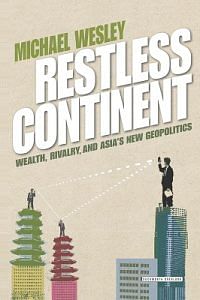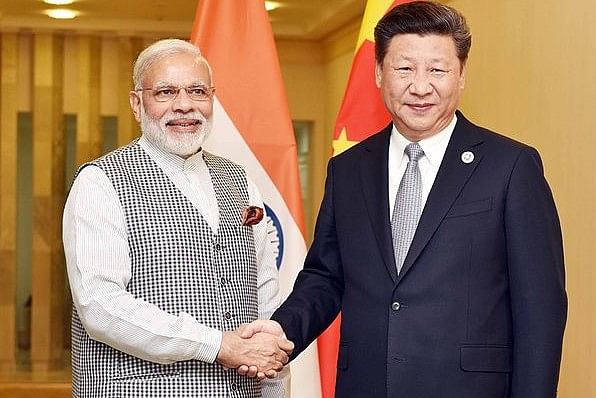Doklam is not a one-off incident. With Asia’s giants experiencing strategic claustrophobia, it is likely that minor events will blow up.
The world will breathe a sigh of relief now that it appears that India and China have found a way to de-escalate the Doklam dispute. But we would be foolish to think this signals a new era of non-rivalry between Asia’s giants. Things will remain tense between India and China in the Himalayas and we could see a Doklam-style confrontation again very soon.
What was curious about the India-China standoff is that it was in neither country’s interest to see it drag on, and possibly descend into open conflict. Asia’s giants have become increasingly interdependent, with total bilateral trade topping $70 billion. They are seen as the leading “emerging” powers that are re-shaping international affairs. They are co-members of influential groupings such as the G20, BRICS, and the Shanghai Cooperation Organisation.
In my recent book Restless Continent (Duckworth Books, 2017) I suggest that Asia’s fast-rising powers are increasingly subject to “strategic claustrophobia”. Rapid economic growth has many advantages, but all too often we ignore the vulnerabilities it creates in the societies experiencing the growth. Because rapid development is like a bicycle – once you begin moving forward, you have to continue generating momentum or you will fall over. As eastern Asia learned in 1997-98, sudden pauses or reversals in growth throw millions into poverty and starvation, drive massive movements of people, and topple governments.
The condition of strategic claustrophobia arises from fears that the world on which large, rising economies are increasingly dependent, will frustrate and block their access to what they need to keep their momentum going. It means that rising powers can often seem aggressive and uncompromising, even though it would appear to outside observers that they should adopt a more nuanced, patient attitude.
Strategic claustrophobia is not new, nor is it confined to twenty-first century Asia. Europe’s great powers in the age of high imperialism in the late nineteenth century each had a bad bout of strategic claustrophobia. Ominously, it drove them to war in 1914 and again in 1939.
What makes strategic claustrophobia even more confounding is that it often deprives national governments of their room for manoeuvre. Given China’s highly opaque policy making processes, it is hard to tell what caused it to start building that road in disputed territory in Doklam. China’s highly decentralised approach to infrastructure building makes it unlikely that it was a central government directive. Rather, what is more likely is that it was the initiative of an ambitious provincial official.
Given the hype and euphoria surrounding President Xi Jinping’s “Belt and Road Initiative”, local officials and state-owned enterprises have unveiled a flurry of infrastructure initiatives around China’s border regions, in the hope of gaining official recognition and even more importantly, cheap state financing.
Rarely do provincial officials give much thought to the possible geopolitical consequences of their actions. And yet once their actions lead to the vigorous reaction of a neighbouring power, national governments find themselves forced to support what in ordinary times they would probably see as a highly marginal initiative. Suddenly, what’s at stake is not a minor road on their territorial periphery, but their credibility in the eyes of their own people and their rivals abroad.
Strategic claustrophobia arises from a sense that the world is weighted against newly rising powers. Justifiably, they believe that those that have risen before them have shaped the world in their own interests and would prefer to keep the commanding heights of the global economy and the institutions of international order to themselves. Importantly, the established powers can themselves suffer a variant of this condition, in their worry that large rising powers will take from them what they have built their own privileges on – be it market share, or industrial production, or cheap energy and minerals, or their say in global bodies.

The bad news is that there are few prospects for a reduction in strategic claustrophobia in the near future. India and China still have decades of rapid, resource-intensive, internationalising growth ahead. They will inevitably chafe against each other and the established powers for decades to come. This is a collective condition that can blow minor initiatives, possibly undertaken by unthinking minor officials, into major stand-offs and even conflict.
Doklam will itself shape how future tensions are interpreted by each Asian giant. Recognising these forces to which they are subject, it is important for New Delhi and Beijing to invest in mechanisms for de-escalating stand-offs, and for preventing them before they occur.
Doklam serves as a potent reminder that India and China have not sufficiently invested in bilateral consultation channels and a regular flow of talks across a broad range of institutions between the two capitals. It was these mechanisms more than anything else that kept the Cold War cold. It is time that similar stabilisers were built into Indo-Chinese relations.
Professor Michael Wesley is Dean of the College of Asia and the Pacific at the Australian National University. His most recent book is Restless Continent: Wealth, Rivalry and Asia’s New Geopolitics (Duckworth Books, 2017)




Not true to say there wasn’t a bilateral consultation mechanism between India and China during the standoff. In fact Hamburg and Beijing talks b/wn India’s NSA and FS with their Chinese counterparts facilitated the disengagement. And yes appreciate India’s Yogic stance thru the episode.